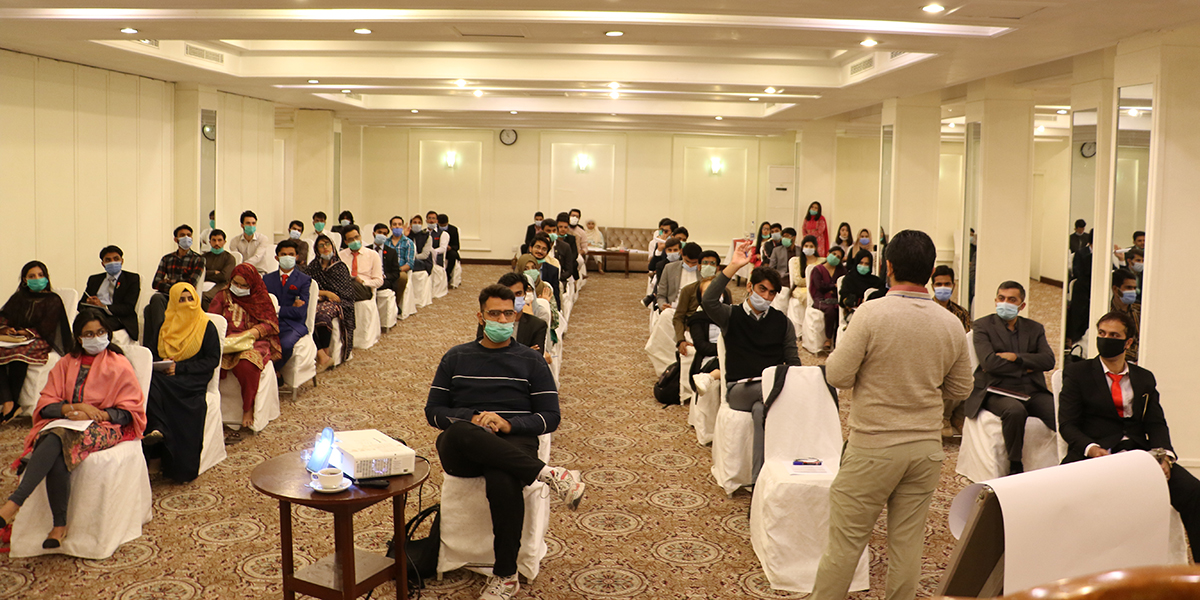The Center for Research and Security Studies (CRSS) conducted the sixteenth round of two-day PACE Collaborative workshops and debates for university students, on November 2 – 3, 2020, in Islamabad. The workshop was conducted under the umbrella of the Pakistan Center of Excellence (PACE), a counter-radicalization, pluralistic values focused project, in collaboration with the Dutch Government. Participants included students from COMSATs, Quid-e-Azam University, Arid Agriculture University, National University of Modern Languages (NUML), International Islamic University, and Bahria University, Islamabad. `A total of 70 students participated in the workshop of which 48 were male participants and 22 were female participants.
Program Director, Mr. Zeeshan Salahuddin opened the session with a welcome note and introductory remarks. He said that PACE is put together by CRSS to counter radicalization, inculcate critical thinking, question preconceived notions and narratives, and embed the national discourse in constitutionalism and the rule of law. He explained that PACE intends to promote the ideals of equal citizenry enshrined within the Constitution of Pakistan. He elaborated the importance of equal citizenry and its implementation within Pakistani culture. For Pakistan to present itself as a progressive rational state at the global level, it is essential to adopt and implement the framework of equal citizenship. Mr. Salahuddin conducted an activity with the participants on importance of finding your ‘why’ in life. He said that the questions of ‘what’ and ‘how’ are secondary and do not depict the purpose of life; however, finding your ‘why’ gives you the drive to move, grow and prosper in life.
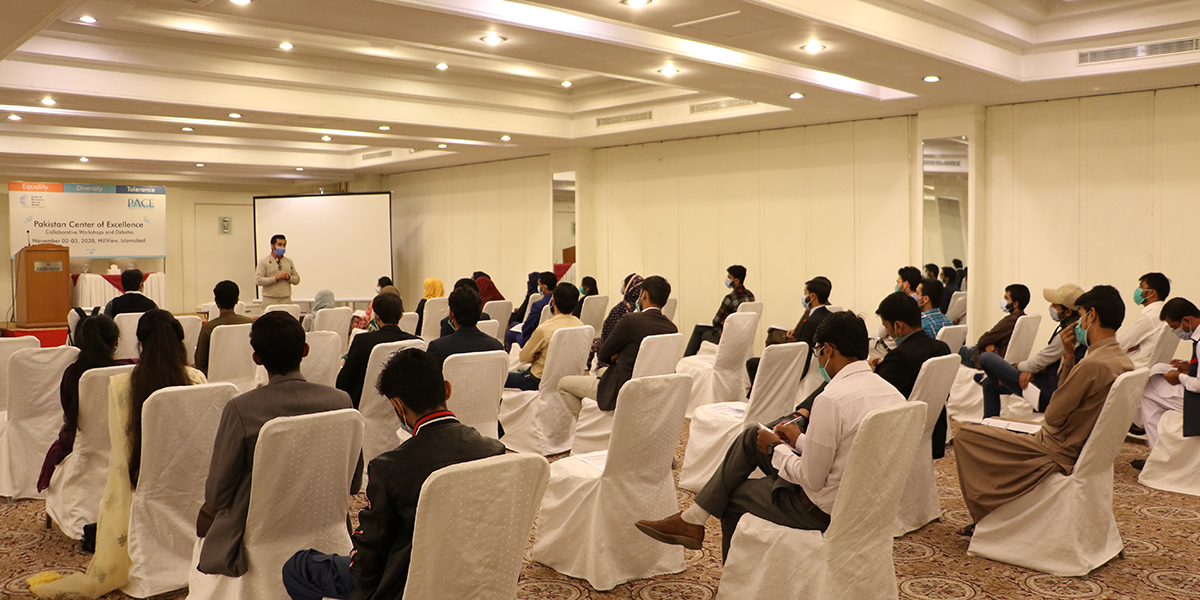
The first formal session of the event was kicked off by Mr. Saddam Hussein who spoke on ‘Leadership and Motivation’. He shared slides on different styles of leadership including autocratic, visionary, affiliative, democratic, pace-setting and coaching. Mr. Hussein stressed that the true measure of leadership is influence; nothing more, nothing less. He added that you don’t have to be extraordinarily brilliant or the smartest one to be a leader, all it takes is courage, confidence and risk-taking. Most importantly a good leader does not have an answer for everything; he does not advice. Instead of having an answer to every question, the most effective leaders are coaches – people who can guide others to arrive at their own solutions, put them into action, and set goals. A poor leader is frequently too busy dispensing advice to fully understand the situation they’re being asked about and because they don’t know all of the issues at stake, they risk focusing on the wrong ones. Further, he discussed some fundamental laws of leadership including the law of process, the law of navigation, and law of respect and so on. He also quoted the examples about some great leaders across the globe including Prophet Muhammad (PBUH), Jinnah, Nelson Mandela, Salahuddin Ayubi, Abraham Lincoln etc. Michael Hart while praising Prophet Muhammad (PBUH) in his book “The 100: A ranking of the most influential persons in history” ranked him the most influential person in human history”. He writes about Prophet Muhammad (PBUH) in his book; “He was the only man in history who was supremely successful on both the religious and secular levels” and he also mentioned, “It is this unparalleled combination of secular and religious influence which I feel entitles Muhammad to be considered the most influential single figure in human history”. The question arises what made him the best leader ever? It was his firmness, truthfulness, leading from the front approach, respecting others, showing empathy, inclusive nature, moderation, humility, mercy and so on. Mr. Hussein, then turned towards the contemporary approach of leadership; in which emotional intelligence takes the driving seat. Emotional intelligence comprises of five key components: empathy, social skills, self-awareness, self-regulation and motivation. Emotions play an important role in personal and professional interactions. Strong leaders understand their own emotions and why they have them. They also identify and acknowledge the emotions of other people. If you can regulate your emotions, you can pretty much accomplish anything in life, added Mr. Hussein. During the session, the trainer also conducted two activities to better understand the concepts of leadership and its different aspects. Towards the end of the session, Mr. Hussein showed the participants some clips from the movie “Mandela: A Long Walk to Freedom”. The purpose of which was to inspire students and make them understand that leadership is not an overnight phenomenon; it is a struggle, a painful one, but if you are determined and consistent, nobody can stop you from realizing your dream.
Ms. Sameena Imtiaz conducted a session on ‘Why Increase Women’s Voices and Visibility?’. She started off with an activity and asked participants to write down names of their favourite leaders. At the end of the activity it was found that all the students wrote down the names of male leaders only. Not a single participants mentioned any women leaders in the world. Ms. Imtiaz explained that we are all influenced by patriarchal mind-set and whenever we think of a leader, we often think of a male. She again conducted an activity and asked participants to mention a few qualities of a good leader. She listed down the qualities which were boldness, honesty, truthfulness, fearless, good communication skills, foresightedness and a lot more. She then asked them if these qualities are only possessed by men. Ms. Imtiaz shared that both men and women can have these qualities but gender stereotyping forces us to see things from a patriarchal perspective. She said many women even in the civilized world are facing problems. Some are still struggling for their basic rights and some trying to find space for themselves at top positions because their roles and contributions are not recognized and acknowledged just like we did in this room while conducting the activity.
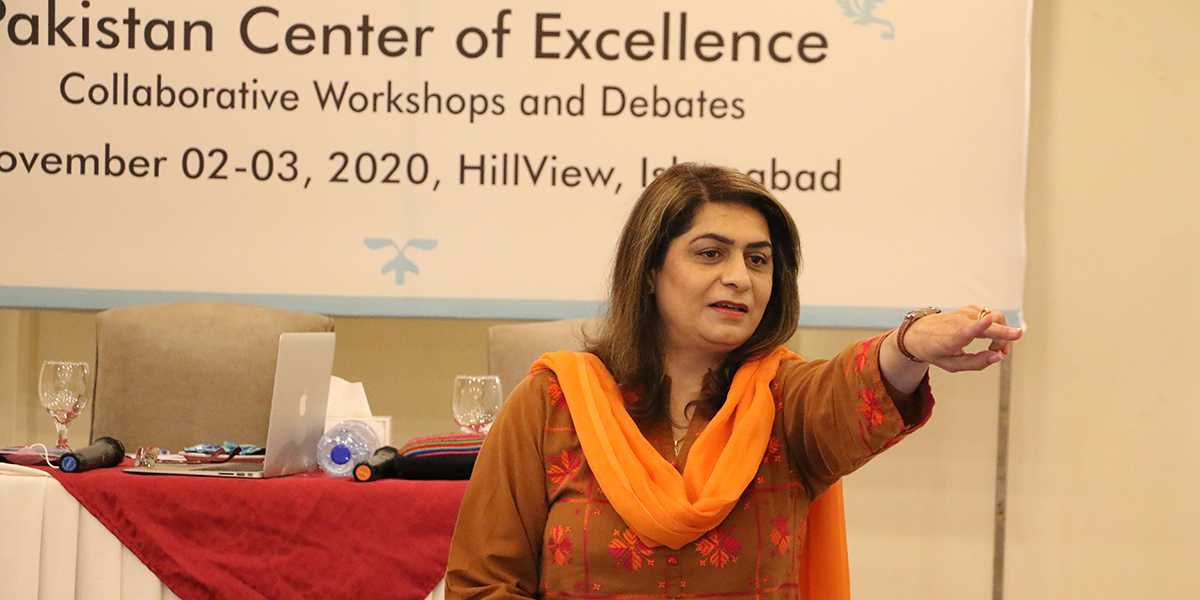
Ms. Sameena added that nature has created men & women with more similarities than differences and prefers diversity hence no two people were created with similar physical or intellectual attributes. Nature believes in equality and not hierarchies and inequalities. She explained that why women can’t reach the top positions;
- Society, religion and culture define gender roles and responsibilities right from birth
- Women have more family responsibilities than men
- We live in a masculine corporate culture
- Women often have insufficient managerial experience
- There are fewer female role models
- Lack of flexible work solutions
- Inherent gender bias in recruitment & promotions, etc.
Ms. Imtiaz also shared some examples from across the globe of women’s roles and contributions. She shared that out of 195 countries, 29 have female heads of state. With 59.3% women in managerial positions, Jamaica tops the list while Columbia stands at second with 53.1%, and USA at 15th with 43%. She also shared that in Thailand more than half of all the scientists are women. Thailand also has a highest proportion (30%) of female CEOs. Fortune 500 (ranks America’s largest companies): 37 of 500 largest companies in the country are led by women. As many as 17 women have received Nobel Prize compared to 90 men. Whereas in Pakistan, out of 342, only 69 women are in National Assembly (NA) of which 60 are reserved seats compared to Australia with 48.7% women in parliament (nearly 50%).
At the end of her presentation, Ms. Imtiaz shared a few points on how can we change this typical patriarchal approach by adding following points:
- Include and retain women in the workforce
- Work and improve your skill set
- SIT on the table and not at the back
- Don’t underestimate your abilities
- Negotiate for position and salary
- Believe in yourself- you can do it
- Attribute your success to yourself and not to “others” like men do
- Make your partner a “real partner” who shares responsibilities
- Don’t leave before it is time to leave
Ms. Humaira Masihuddin kicked off her session speaking on the theme of ‘Pluralism and Multiculturalism’. She said that human beings belong to one origin and one place, she said, and no purely homogeneous society exists in the modern world. Most societies consist of different ethnic groups. She defined minorities as a group of people who are singled out from the other groups and are treated differently because of their physical or cultural characteristics. Minority is a subordinate group as opposed to the dominant group. The concept of multiculturalism revolves around a society with heterogeneous beliefs and set of ideas. Multiculturalism makes a society diverse. Respect for diversity shapes coexistence, peace, and harmony under a political and institutional framework. Differences are not challenges and do not impose any limitation on growth of an individual or society. Every individual has a right to be different and be respected by all. In Islam, the concept of diversity is clearly inclusive, she continued. In Quran, she said, humans are addressed to treat one another without any discrimination and respect each other’s beliefs and should never use abusive language or show disrespect towards others. If we look at the character of the Holy Prophet (PBUH), it is evident how He always respected the non-Muslims in Mekkah and Medina. Even on the day Mekkah was conquered by Muslims, Prophet (PBUH) forgave all His enemies for the harms that they had inflicted on Him. Ms. Humaira also made note of the last sermon of the Holy Prophet that said “All mankind is from Adam and Eve, an Arab has no superiority over a non-Arab nor a non-Arab has any superiority over an Arab; also a white has no superiority over black nor a black has any superiority over white except by piety (taqwa) and good action”. In short, Islam is the religion of tolerance and coexistence, love and peace for others regardless of their religions or ethnicities.
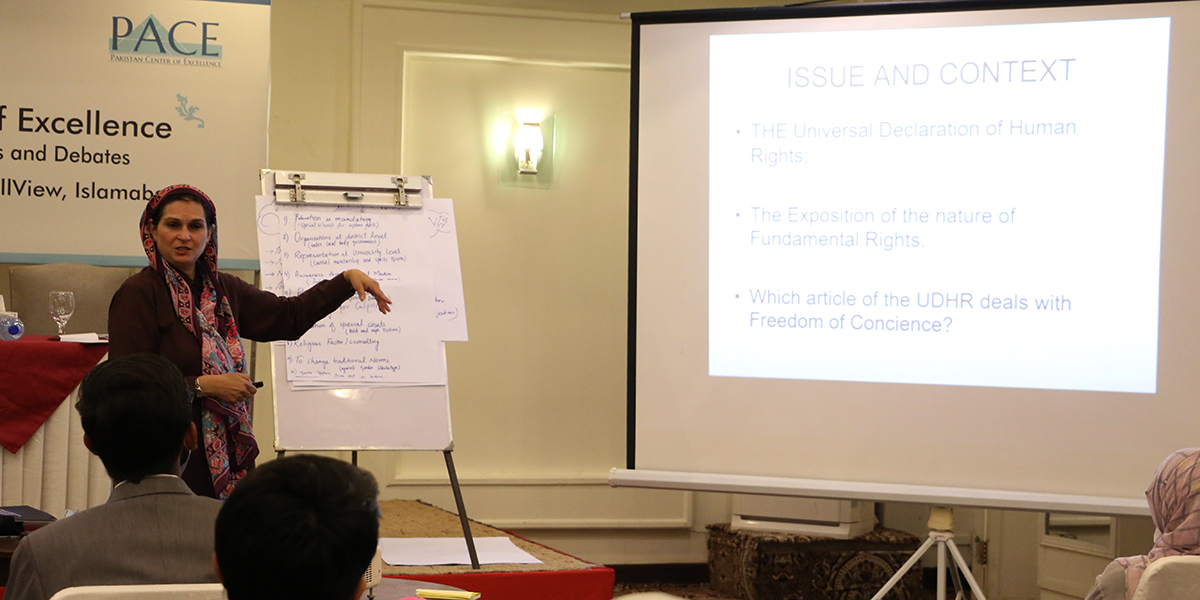
The last session of the day was conducted by Ms. Ammara Durrani ‘Good Governance and Rule of Law’. Ms. Durrani shared that in late 1990s, the term of good governance was used by President General Pervez Musharraf to legitimize his rule. He was very smart while this term because his argument was that you don’t need democracy for good governance. Similarly, western liberal thought propagates that you don’t need religion for good governance. In the twentieth century especially after World War II, there were huge changes in the international system and the concept of nation state emerged out of it. As a post-colonial country, Pakistan also became a nation state. It’s an Islamic Republic but the structure of the country is nation state and largely it follows the structural parameters of the liberal international concept of nation state. This system believes that good governance does not necessarily stem from religion. Power is something that state uses to establish its writ, to build and protect its borders, to generate revenue to govern. The objective is to govern the people adopting whatever ideology (Islamic Republic, Communism, and Capitalism). Good governance is always based on accountability, transparency, responsiveness, equitable and inclusive, effective and efficient, rule of law, participatory and consensus oriented.
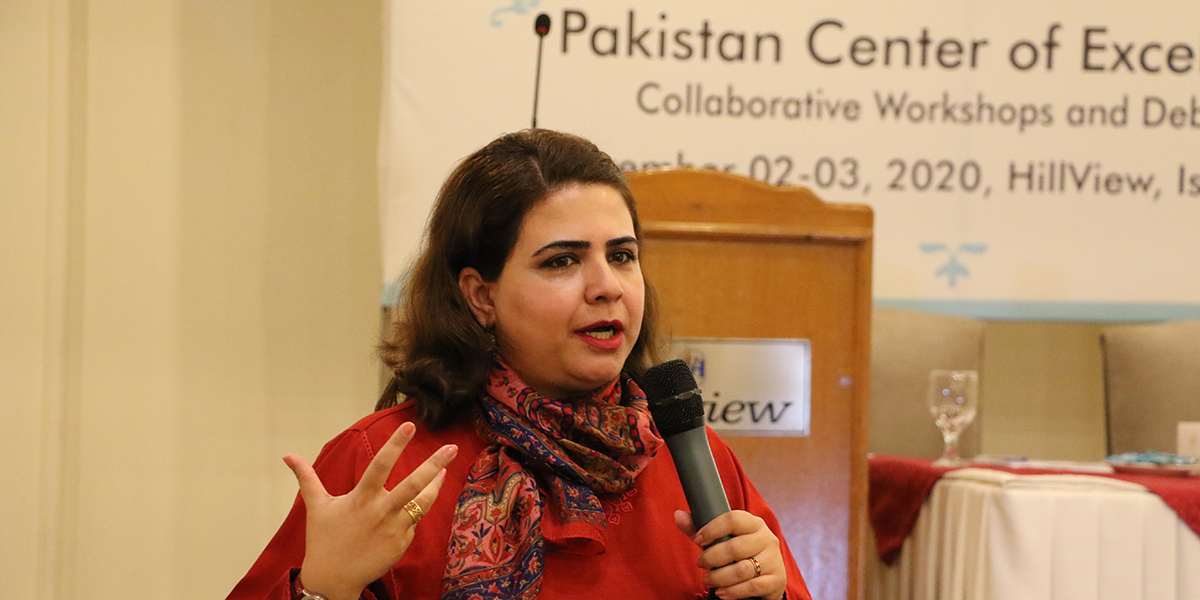
The closing session was conducted by Mr. Zeeshan Salahuddin who described various chemicals of brain. He explained the functioning of Endorphins, Dopamine, Serotonin, and Oxytocin, how these chemicals impact our moods and how can they be controlled to have regulate our lives.

